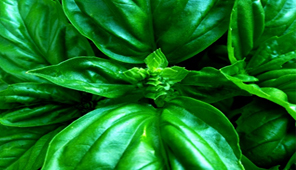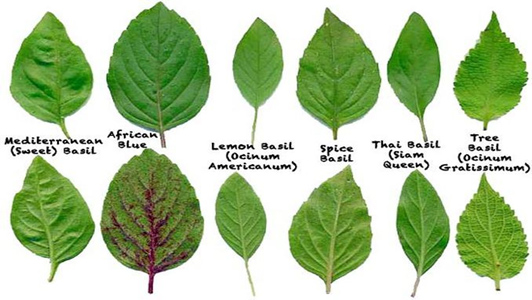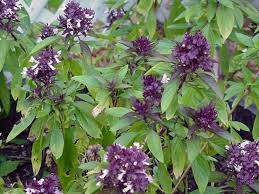
Family: Labiatae or Lamiaceae
Genus and species: Ocimum basilicum, O. sanctum
Also known as: Sweet basil, St. Josephwort
Noteworthy: There are different kinds of basils found across the world, such as Lemon Basil and Tai Basil. Tulsi Holy Basil-Ocimum tenuiforum, revered in India and known throughout, (though its name means “the Incomparable One”) is another basil greatly known for its culinary and medicinal strengths.
Origin: Although Basil was written about in ancient Greek texts by the physician Dioscorides, it is native to and found in ancient manuscripts from India; its cultivation has been there for at least 5,000 years. There are some indications that Basil originated in Africa. Today, different types are grown all around the milder climates of the world.
Flavor and Energetics: temperature is warming; flavor is pungent, sweet and bitter
Plant & Growth: fragrant, glowing greens, purple, mint family’s square stem, toothed, pointed, oval leaves, spikes of small white or purple flowers that blossom in summer. Pinching promotes growth. Leaves are primarily used, young stems can be diced, flowers can be used.
History and Folklore: Basil comes from the Greek word “basileus”, meaning “king”. Part of the species name in Latin is “sanctum” which translates holy-sacred. If the power is in the name, Basil is one of the holy royalties of the herbs. It has had a contradictory reputation throughout the ages. The ancient Greeks and Romans believed that to grow sweet, fragrant basil one needed to shout and swear while sowing the seeds. 1000 years later the Roman naturalist Pliny and Arab and Chinese physicians, would defend it as an incredible healer for stomach, kidney and blood ailments, as well as insect and snake bites. Throughout the ages it has been used to help with fevers, epidemics and malaria.
In India it was held as a sacred herb, a protector of life and death. One would place sprigs of basil on the chests of deceased loved ones to provide safe journey into the next life. In Italy, Basil was a love herb. When a woman placed her basil pot on the balcony it meant she was ready to receive her lover. Exchanging sprigs was a sign of faithfulness. Haitians believe in Basil’s protective powers and sprinkle basil water around doors to ward off evil and bring abundance.

Properties: Antibacterial, anti-infectious, anti-inflammatory, antioxidant, antiseptic (stomach-intestinal), antispasmodic, antiviral, decongestant (veins, arteries of the lungs, prostate), stimulant (nerves, adrenal cortex). There are tests out showing basil may be anti-catarrhal and antidepressant (French medicinal uses have been for migraines, mental fatigue, menstrual periods-scanty or poor blood flow).
Culinary Possibilities: great with salads—brightens the greens up, as well as the oil and vinegar. It is a good partner with other vegetables-summer squash, onions, corn, tomatoes and cheese. Basil eases the damp stagnation of cheese. It marries with chicken beautifully. Some of the best Tai food is made with basil and chicken (personal favorite). Great for soups, adding for the flavor of canning tomatoes, making pestos, enhancing water, teas, even basil breads and cookies.
Body System(s) most strongly affected: Cardiovascular system, Muscles and Bones.
Common Primary Uses: Aches and pains, digestional issues and cramps (abdominal), mental fatigue, anxiety, insomnia and/or depression from nervous tension, muscle spasms, wounds, acne, insect and snake bites, intestinal parasites, bronchitis, chronic colds, whooping cough, rhinitis(inflammation of nasal mucus membranes, gout.
Immune Stimulant: There are a number of studies that show basil stimulates the immune system by increasing production of disease-fighting antibodies by up to twenty percent. Thus it’s effectiveness against traditional uses of treating bacteria and infectious illnesses.
Contraindications: Not to be used for medicinal purpose in pregnancy or nursing because of the possibility of uterine stimulation and labor inducing movement.
Nutritional Value: Fresh basil, chopped, fresh 0.50 cup offers 97% of your vitamin K daily requirements, 12% of manganese, 8% of copper, 6% of vitamin A. It also has 3 to 5% of vitamin C, iron, Folate, magnesium-even omega-3 fats.

“There is nothing in the most advanced contemporary medicine whose beginning cannot be found in the medicine of the past.” Maximilien E.P. Littré
References:
“The Healing Herbs” by Michael Castleman. 1991, Rodale Press, Emmaus, PA.
“Reference Guide For Essential Oils” by Connie and Alan Higley. 2013, Abundant Health, Spanish Fork, UT.
“Prescription for Herbal Healing” by Phyllis A. Balch, CNC. 2002, Avery, NY. NY.
